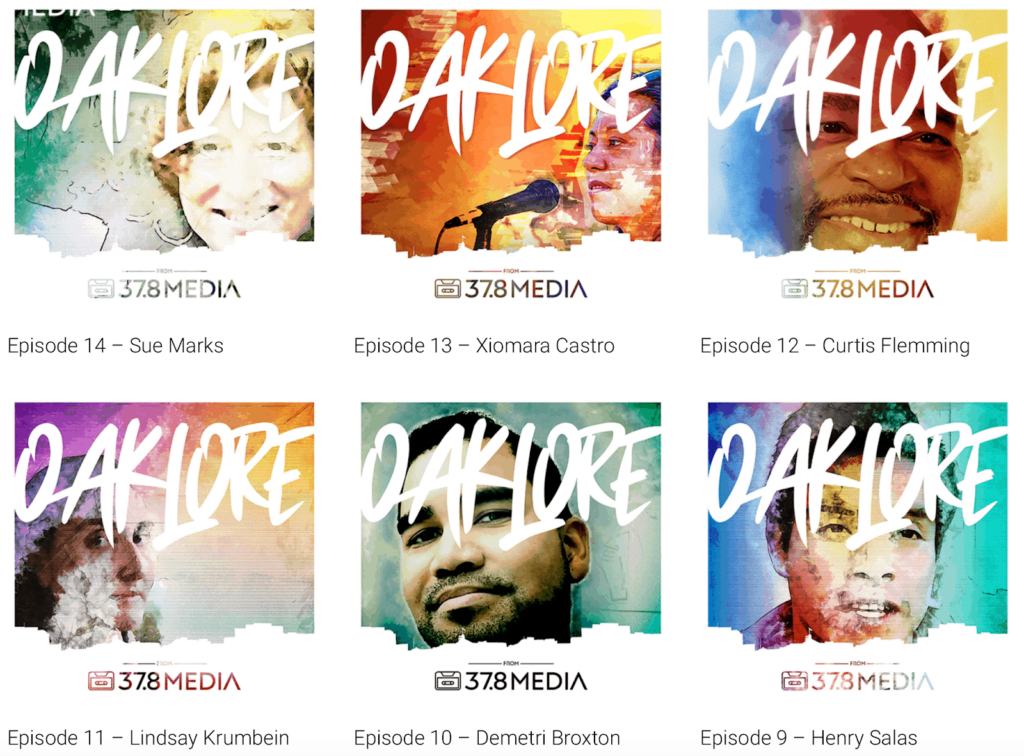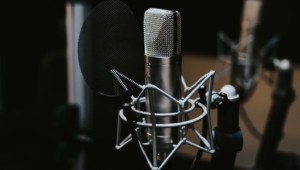Oaklore: A Student Podcast About Difference Making in Oakland

Oaklore—a play on Oakland and folklore—captures stories of changemakers in the city and explore the concept of cross-generational storytelling. It’s a student-produced podcast series from Latitude High in Oakland, California.
Guests have included:
- Cultural researcher Sue Marks about the importance of preserving local history.
- Gritty City Repertory Artistic Director Lindsay Krumbein.
- Lakisha Young, founder of Oakland REACH on making the powerless parent powerful.
- Founder and Creative Director of Pochino Press Xiomara Castro on the benefits of a multimedia stage for change makers and culture creators.
- Artist and owner of a coffee business Keba Konte on how coffee can be a source of change.
Director of Instruction John Bosselman said, “The story of Oaklore comes from the idea that we wanted our students to capture stories of changemakers in the city of Oakland. They interviewed changemakers last year and turned those interviews into a rough cut, telling that person’s story of their life and how they got to do what they do.”
This year, the focus shifted to be on individuals who are working to address critical housing issues in the Bay Area.
Latitude students participate in extended learning opportunities including studios, internships and student-designed businesses. In addition to traditional classes, students spend much of their school time in the community: volunteering for local nonprofits, interning at local businesses, meeting with mentors, interviewing local experts and professionals for class projects, and learning about the city around them. Students visit over ten workplaces every year to ignite their career interests and to collaborate with professionals on real-world projects.
Opened in 2018, the charter high school will serve 360 students at full enrollment. The goal is for students to leave with “the agency to navigate the complex world” and competencies that equip graduates to be “powerful problem-solvers, communicators, and changemakers.”
Latitude students do real work in and with the Oakland community. Studios engage students in community-connected projects, field experiences, and opportunities to work with local professionals.
Across all of their learning experiences Latitude students are building nine competencies:
designer, learning inventor, critical dissector, sense-maker, word sculptor, mathematical thinker, historical disruptor, self-builder, and co-creator.
Students meet with an advisor every day along with 14 to 18 of their peers. They build relationships, work on social and emotional skills, and reflect on strengths and interests for career and life.
On Thursday, March 12, the Latitude team received notice that their facility would be temporarily closing. That night they set up a schedule and began operating with both synchronous and asynchronous work on Monday, March 16. “We have focused on routine, meaningful work and processing for the students,” said Bosselman.
Next week will be spring break, “but I think we all are ready for a bit of a pause in this emotional time,” said Bosselman.
While you may have some extra time at home right now, check out the Oaklore podcast to find inspiration.
For more see:
- Five Learner-Centered Opportunities in Oakland
- Difference Making: New Tech Makes it Easier than Ever
- The Case for Contribution: Why Schools Should Empower Difference Making
Stay in-the-know with innovations in learning by signing up for the weekly Smart Update.
This post was originally published on Forbes.







0 Comments
Leave a Comment
Your email address will not be published. All fields are required.